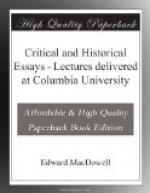The vital germ of music, as we know it, lay in the fact that it had always found a home in the hearts of the common people of all nations. While from time immemorial theory, mostly in the form of mathematical problems, was being fought over, and while laws were being laid down by religions and governments of all nations as to what music must be and what music was forbidden to be, the vital spark of the divine art was being kept alive deep beneath the ashes of life in the hearts of the oppressed common folk. They still sang as they felt; when the mood was sad the song mirrored the sorrow; if it were gay the song echoed it, despite the disputes of philosophers and the commands of governments and religion. Montaigne, in speaking of language, said with truth, “’Tis folly to attempt to fight custom with theories.” This folk song, to use a Germanism, we can hardly take into account at the present moment, though later we shall see that spark fanned into fire by Beethoven, and carried by Richard Wagner as a flaming torch through the very home of the gods, “Walhalla.”
Let us go back to our dust heap. Words have been called “decayed sentences,” that is to say, every word was once a small sentence complete in itself. This theory seems true enough when we remember that mankind has three languages, each complementing the other. For even now we say many words in one, when that word is reinforced and completed by our vocabulary of sounds and expression, which, in turn, has its shadow, gesture. These shadow languages, which accompany all our words, give to the latter vitality and raise them from mere abstract symbols to living representatives of the idea. Indeed, in certain languages, this auxiliary expression even overshadows the spoken word. For instance, in Chinese, the theng or intonation of words is much more important than the actual words themselves. Thus the third intonation or theng, as it is called in the Pekin dialect, is an upward inflection of the voice. A word with this upward inflection would be unintelligible if given the fourth theng or downward inflection. For instance, the word “kwai” with a downward inflection means “honourable,” but give it an upward inflection “kwai” and it means “devil.”




